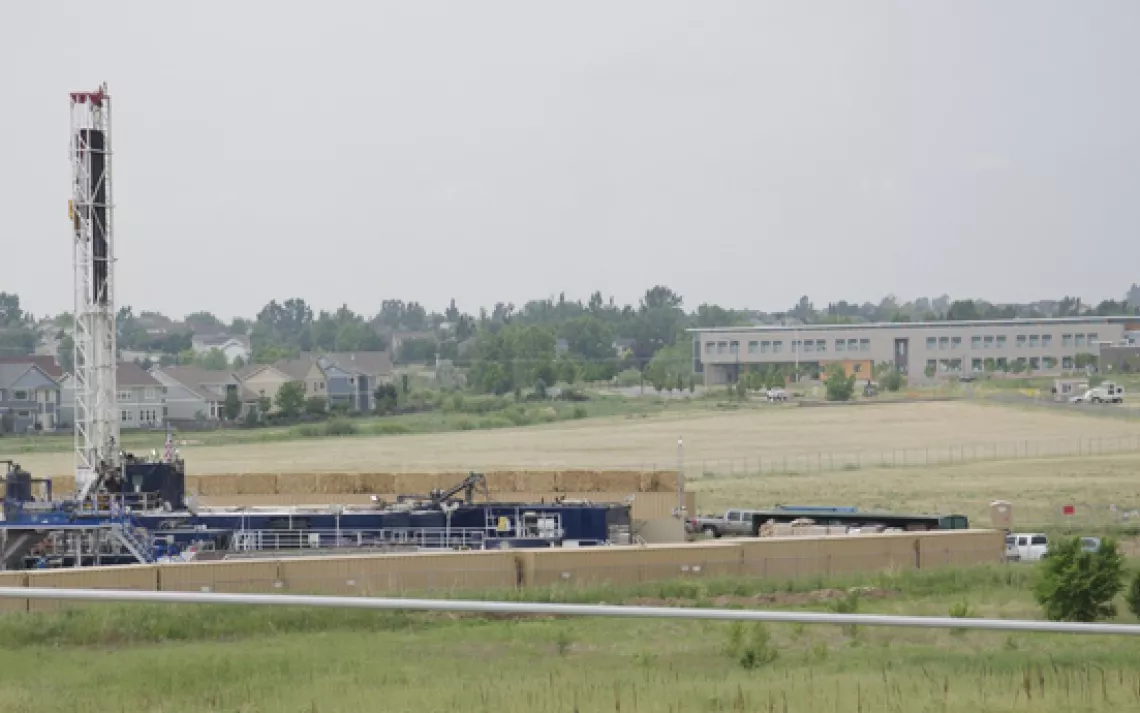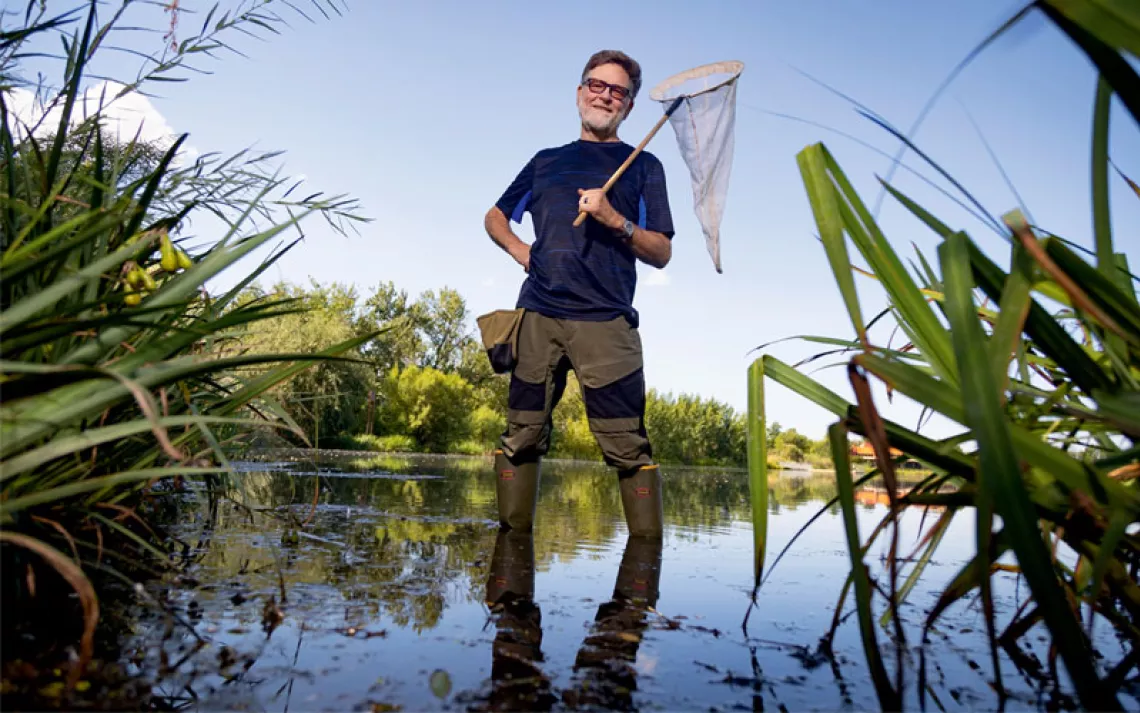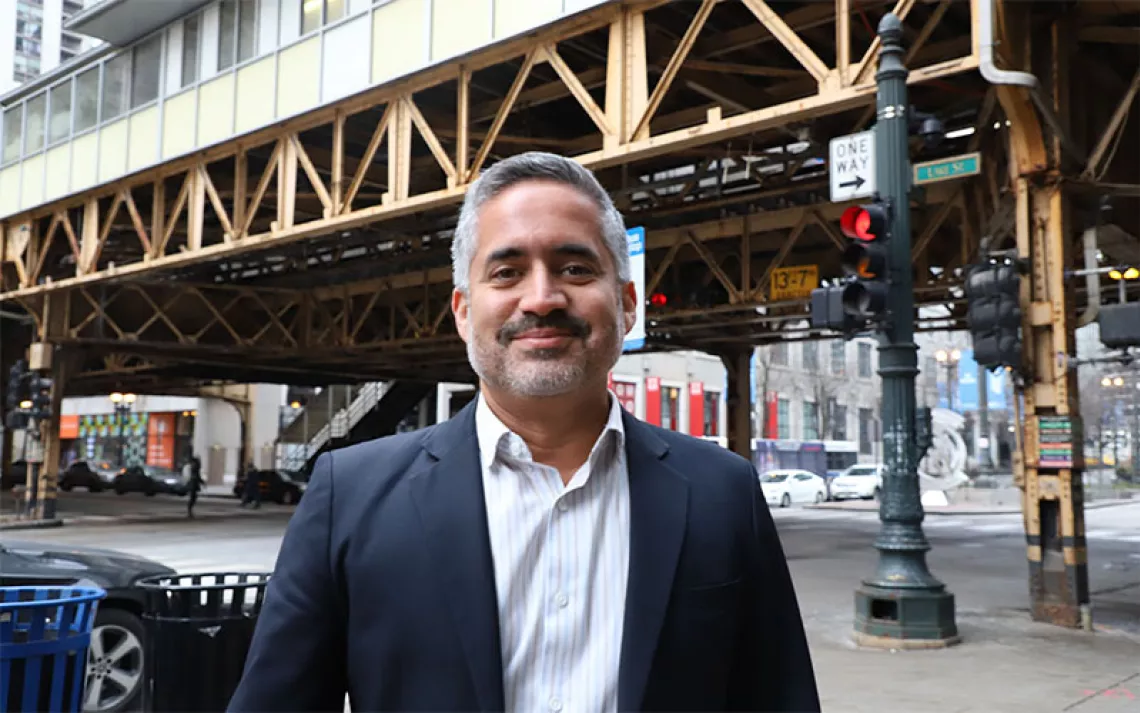Fractured
Colorado is split. Some want to ban fracking, some want to frack more.

Colorado's fracking boom has led to natural gas wells everywhere, like this one next to the Red Hawk Elementary School in the Weld County town of Erie. | Photo by Aurora Open/SuperStock
The halls of the Crescent Cove Apartments in southeast Greeley smell vaguely of oatmeal and hot cheddar. Most residents won't open their doors for a stranger, and of those who do, all but one refuse to tell me whether they've heard about the 67 oil and gas wells slated to go in across the street. They say, "I'm not interested," as if I were selling something. Chances are, though, that most haven't heard about the wells. Although the state mandates that drillers notify landowners within 500 feet of a proposed fracking site, renters need not be notified.
I'm interviewing people here in northern Colorado because they'll soon determine the future of fossil fuel extraction--or so activists hope. Shortly after my visit, three towns (and possibly a fourth, where the vote was headed for a recount at press time) will ban or impose moratoriums on hydraulic fracturing, or fracking--the process of injecting highly pressurized water, sand, and chemicals thousands of feet below the earth, splintering rock to release oil and natural gas.
In the same election, citizens of five counties even farther east, where the mountains flatten into stands of hay and corn, will voice their desire to form a new state called North Colorado. The quixotic secession movement is, in part, a reaction to two new state regulations, one calling for energy cooperatives to double their renewable energy output by 2020, the other requiring that wells be drilled at least 500 feet from the nearest occupied building. Would-be secessionists find these requirements so onerous that they would prefer to establish their own state.
Greeley, population 95,000, is in Weld County, which spearheaded the secession threat (although its voters ultimately rejected it). Weld has the most active oil and gas wells in the nation--more than 20,000. There's no talk of a fracking ban in this city of 427 wells, a number that's predicted to quadruple within the next few years. Greeley already receives $3.3 million annually from drilling operations and attributes one in nine local jobs to the fracking boom. Last summer, a drilling rig went in about 1,000 feet from Mayor Tom Norton's home. "It's not that you want [the wells] here," he told the New York Times, "but you've got to place them somewhere."
The Crescent Cove resident who finally agrees to speak with me, Alfredo Carrillo, 22, invites me in but deflects my question concerning the wells. "I work in the oil and gas industry," he says. He's playing Grand Theft Auto V but only intermittently, because his 15-month-old son, Louis, has just figured out how to work the power button on the Xbox, which happens to sit at toddler level. Carrillo reprimands his son softly ("Louis!"), and the boy responds in giggles.
Carrillo works with a crew that services wells that aren't extracting properly. He fastens or unfastens latches on metal traveling blocks as they pass him going up or down the drill line. He latches or unlatches 220 times a day--he's counted--for $16.50 per hour.
"You're not afraid of blood, are you?" Carrillo asks, setting aside his controller. He unravels a bandage down to a black finger. "Got stuck in the latch the other day, and the block kept moving. Almost ripped the tip off." He rewraps the bandage. "I mean, the job is good, I like my team--they know how to work fast."
The apartment's windows are shut tight because, less than a week after northern Colorado was hit by a 1,000-year storm, the Front Range's relentless sun has returned without apologies. On the couch, it's cool. Carrillo rubs his chin. "So they're really gonna drill here?" he asks.
If Greeley oil and gas developer Mineral Resources does indeed construct all 67 permitted wells, the 10-acre sloping grass field across the street from us will be transformed into Colorado's largest well pad. The field is ringed by the 264-unit Crescent Cove Apartments, a Walmart, a string of budget hotels, and an elementary school. One of the reasons oil and gas operators want to drill within city limits is access to water. Typically, drillers in rural areas truck in up to 600,000 gallons just for the initial operation. But in Greeley, Mineral Resources can draw water directly from city hydrants. The water is pumped two miles underground, where it fractures the 80-million-year-old Niobrara shale rock formation to produce both natural gas and oil.
Before I respond, Carrillo answers his own question. "Well, of course, it's a definite thing. They want to drill anywhere. Have you heard about fracking? All that [stuff]'s contaminating our water. I saw it on the news: water on fire."
DAYS AFTER THE SEPTEMBER DELUGE, in which floodwaters spilled at least 34,500 barrels of oil in northern Colorado, thousands of people are laying out their belongings to dry on front lawns. While touring devastated communities, Governor John Hickenlooper declares that Coloradans will have to work together to recover, "then you all can get back to seceding." (Since Hickenlooper supports stricter environmental regulations on fracking but opposes municipal fracking bans, he irritates people on both sides of the debate. They often overemphasize the H in his name, as if they were coughing up chicken bones.)
I'm traveling in a car with four anti-fracking activists who are documenting the storm's aftermath by taking photos of Weld County's numerous flooded drill sites. The toppled tanks we encounter may or may not contain water, fracking fluids, oil, or natural gas. They may or may not emit fumes: benzene, xylenes, 1,3-butadiene.
When we discover a Hydrovac truck suctioning the perimeter of a battery of eight tanks, Robert Winkler of the local anti-fracking group Weld Air and Water guns his SUV down a dirt path to the tanks. "Get a photo of the well site number!" he shouts. "The number!" He needs it to determine whether Mineral Resources reported this spill to the Colorado Oil and Gas Conservation Commission, which oversees the state's oil and gas operations. The industry-friendly commission, notes Lauren Swain, communications coordinator for the Beyond Oil and Gas Team of the Sierra Club's Rocky Mountain Chapter, has rejected only two drilling proposals in its 60-year history.
Yellow rubber suits run at us, yelling, "Get off! This isn't your property!"
Winkler retorts, "This isn't your property either! You have mineral rights. You don't have surface rights!" I take a photo of two men in mid-scream taking a photo of us; somewhere there must be a photo of us taking a photo of them.
(Mineral Resources does report the spill at well site 05-123-25900 four days later. The form states, "Distance in feet to nearest surface water: 800. Surface water impact? Y. Prevent Problem: Rebuilding containment around tanks and separators." Add it to the 2,000 other spills and releases reported in Colorado in the past five years.)
In Greeley, I closely inspect another fallen tank. "For your own safety, hold back," a worker says, but I ignore him. The odor doesn't hit me right away, but when it does, it goes straight to the brain. It smells simultaneously sweet and bitter, and I nurse a headache for the rest of the day. According to a 2012 study by the Colorado School of Public Health, people living within a half mile of oil and gas operations are exposed to volatile air compounds at five times the level considered safe. The chemicals can cause eye irritation, throat soreness, breathing difficulty, and headaches.
Back in the car, the four activists sift through stacks of fracking literature, much of which they can recite from memory. "What we need," Swain says, "is a moratorium."
"Or at least a public health study," counters Winkler. He tempers expectations for good reason. Construction has already begun on a 435-mile pipeline to get Greeley's natural gas to Texas, but Weld Air and Water formed less than six months ago. Winkler says that at the city council meetings he and fellow activists attend, "it's already predetermined what's going to happen. They let the oil and gas guys go first, and give them unlimited time. Then we go, and all we get is three minutes."
Several people I talk to grumble that Greeley is, was, and ever shall be "a fracking Republican redneck cowboy town." But history challenges that stereotype. In 1985, Greeley's city council banned drilling within city limits. Seven years later, Colorado's Supreme Court overturned the ban, arguing that it hindered an overriding state interest in oil and gas development. Cities have jurisdiction over surface property rights, but they don't have authority over mineral rights, the court decided. After that, Swain says, "it was as if Greeley said, 'If we can't beat them, we might as well join them.'"
That case, Voss v. Lundvall Bros., set the legal precedent that state attorneys are referring to today as they sue Longmont, a town 30 miles west of Greeley that in 2012 voted 60 to 40 percent to ban fracking. Swain predicts that the outcome of the Longmont lawsuit will determine the fate of the other Colorado towns that recently banned or suspended fracking. Fort Collins council member Gerry Horak agrees. "I'll bet anyone who wants to bet that we get sued," he told a local NBC reporter. Nationwide, more than 200 municipalities and counties in 16 states have enacted bans or moratoriums. Of those, nine have subsequently been sued by the oil and gas industry, their state government, or both.
Swain attributes this conflict to weak federal laws: "Because the oil and gas industry is exempt from major provisions of the Clean Air Act and Safe Drinking Water Act, and state laws are inadequate and not properly enforced, local ordinances and ballot initiatives are currently the primary recourse available to protect communities from the hazards of drilling and fracking."
THIRTY MILES NORTHEAST of "redneck cowboy" Greeley is Fort Collins, a city of microbreweries and bicycle traffic jams and 17 wells. Last March, its city council banned fracking, but then reversed itself two months later, fearing that the state would sue the town as it had Longmont. So activists from Citizens for a Healthy Fort Collins petitioned the council to put a five-year fracking moratorium on the ballot. Last November, 55 percent of Fort Collins voters approved the moratorium.
In September, hours before the big storm, I travel five miles north of downtown to the Hearthfire neighborhood, where I walk around some of Fort Collins's existing wells to the wheezing and growling of a garbage truck making its rounds. Most of the houses here have stone facades and are so new that they face empty, numbered, still-for-sale lots. Some butt onto fences with yellow signs that read, "Caution H2S Poisonous Gas." Inside each fence sits a well.
Some of these wells have been operating for 40 years. The pumps creak as they swing up and down, pecking at the ground. Andrea Lamons, who lives about 100 feet from one of them, says the repetitive squeaking helps her sleep.
"You have to realize that the wells were already here long before us," Lamons says. "We chose to come to them."
At a house a few doors down the street, a guy is painting a ceiling while the homeowners vacation in Yellowstone. "When I first drove into here, I saw the nice big houses, and I saw the wells, and thought, 'What the hell is going on?'" he says. "But I'm just a layman. I don't understand all the ins and outs." He lifts his paint can. "Can you step back and tell me if you see sort of a white patch on the ceiling? These people are really picky."
Supporters of Fort Collins's moratorium argue that it came just in time. Eight months before the election, Prospect Energy announced plans to drill six more wells in Hearthfire and other subdivisions. The company also leased 1,150 acres near the city's Anheuser-Busch brewery, according to its lease agreement, "for the purpose of investigating, exploring, prospecting, drilling for, and producing oil and gas." "Without a moratorium," Swain says, "Fort Collins could turn into Greeley."
I MEET SHANE DAVIS at the Bean Cycle in Fort Collins, where we drink loose-leaf tea out of beer mugs. Many credit Davis with inciting anti-fracking sentiments in Colorado four years ago with the creation of his website wtfrack.org. Back then, Davis lived in Weld County, where he'd open his windows to the odors of 75 oil and gas wells within a mile of his house. When he began connecting the fumes to his chronic nosebleeds and headaches, Davis quit his job as a communications director, moved to Fort Collins, and became a full-time volunteer anti-fracking activist.
It isn't so easy to escape fracking's effects. When the Poudre River, which flows through downtown Fort Collins, dries to a trickle in summer, fracking in Weld is partly to blame--the 500 million gallons of water that drillers in Greeley empty from city hydrants each year come from rivers upstream of Fort Collins. In addition, northerly winds blow in the propane from leaking wells in Weld, where oil and gas development accounts for 55 percent of the region's ozone-forming hydrocarbons. According to a University of Colorado Boulder study, Fort Collins's atmospheric propane levels exceed those of car-dense Houston.
Davis is "ecstatic" about November's ballot results. "I call checkmate to the governor and to the oil and gas industry," he says. "We the people are taking the government back. We are telling them what to do. That's how it's supposed to be anyway."
Even so, he's concerned for Weld County: "The industry can't drill along the Front Range now, so that drilling is going to be shifting toward Weld." But he also sees hope for change, as evidenced by Weld voters' rejection of the secession proposal. And in the afterglow of recent municipal victories, northern Colorado's anti-fracking activists are ready to look beyond their hometowns to the rest of the state. "Somehow we'll take Weld on," Davis says, "even if we have to put a fence around it and call it a Superfund site.
FIGHTING FRACKING ON THE GROUND Kelly Giddens is president of Citizens for a Healthy Fort Collins (HealthyFoCo) and mother of four children. She is also vice chair of the Poudre Canyon Group of the Sierra Club's Rocky Mountain Chapter. HealthyFoco was founded last June, after the Fort Collins City Council overturned the fracking ban that it had previously voted in favor of. Sierra: Why did you pursue a fracking moratorium at the ballot box? Kelly Giddens: The Colorado Department of Public Health and the Environment has enough concern about oil and gas operations to initiate a study on the industry's effects on air quality. That study won't be done until 2016. With that in mind, we thought it would make sense to apply the precautionary principle: If we don't yet know how it's affecting our air, then we should wait for more data before we decide whether to allow fracking in our community. Sierra: Did you expect Ballot Issue 2A, which would establish a five-year fracking moratorium in Fort Collins, to pass? Giddens: Of course. I never imagined for one moment that the outcome would be any different than it is. It just makes sense. We do everything that we can to protect our kids, like reading food labels. So fracking haphazardly, without asking questions, didn't make sense to me. I didn't think it would make sense to the voters either—and I was right. Sierra: Do you think the oil and gas industry will sue Fort Collins in response? Giddens: It's possible, but if they do, we have a legally defensible position. HealthyFoCo is an organization filled with moms and dads and grandparents and other citizens who are genuinely concerned about public health. The oil and gas industry may have the right to minerals, but they don't have the right to poison a population without their consent. Sierra: What about the state? Do you think Colorado will sue Fort Collins like it did Longmont? Giddens: Looking at the polling data, we had heavy support from Democrats. So it seems to me it would be counterproductive for Governor Hickenlooper to take on five communities. I don't anticipate him doing that in an election year. Sierra: How did HealthyFoCo spread the word about the ballot issue? Giddens: Everyone talked to their friends, neighbors. We knocked on doors. We made phone calls and put up yard signs. We had a really strong grassroots effort—at least 150 volunteers. And it could have been even more, because those volunteers talked to their friends, and those people talked to their friends. —N.S.
 The Magazine of The Sierra Club
The Magazine of The Sierra Club







